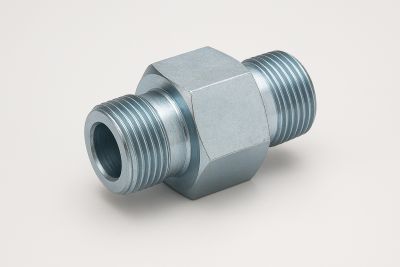Hydraulic systems are the backbone of countless industries, powering everything from heavy machinery to precision equipment. At the heart of these systems lies one critical factor: secure, leak-free connections. Without them, hydraulic performance suffers, safety is compromised, and costly downtime becomes inevitable.
That’s where fittings come into play. Fittings ensure that hydraulic lines remain sealed under high pressures, maintaining efficiency and reliability. Among the many types of fittings available, the hydraulic tube hex union stands out for its strength, versatility, and ease of use.
What is a Hydraulic Tube Hex Union?
A hydraulic tube hex union is a type of fitting designed to connect two hydraulic tubes securely. Its defining feature is the hexagonal body, which allows technicians to easily grip and tighten the union with standard tools such as wrenches.
Key characteristics include:
➡️ Hexagonal body for convenient installation and removal
➡️ Threaded connections that provide a strong, sealed joint
➡️ Reusability, making it suitable for systems that require regular maintenance
Unlike couplings or permanent fittings, hex unions allow for disassembly without damaging the tubing, offering flexibility in repair and servicing.
Why Choose a Hex Union for Hydraulic Tubing?
Hydraulic tube hex unions are widely used because they deliver:
➡️ Strong and reliable joints that withstand extreme pressures
➡️ Easy installation with common hand tools—no special equipment required
➡️ Leak-free performance, crucial for both safety and efficiency
➡️ Maintenance flexibility, since tubes can be disconnected and reconnected multiple times without compromising integrity
Applications of Hydraulic Tube Hex Unions
Thanks to their durability and versatility, hex unions are found across a wide range of industries:
➡️ Industrial machinery – Keeping production lines running smoothly
➡️ Automotive and heavy equipment – Ensuring reliable hydraulic braking, steering, and lifting systems
➡️ Agriculture and construction – Supporting tractors, loaders, and excavators under demanding conditions
➡️ Marine and aerospace – Withstanding high-pressure environments where reliability is mission-critical
Material and Design Considerations
The performance of a hydraulic tube hex union depends heavily on its material and design.
1. Common materials: Carbon steel for strength, stainless steel for corrosion resistance, and brass for lighter-duty applications
2. Corrosion resistance: Essential for outdoor, marine, or chemical environments
3. Thread standards: Available in NPT, BSP, JIC, and other standards to ensure compatibility with global systems
4. Pressure ratings: Must match the working pressure of the hydraulic system and fluid type
Installation Best Practices
To maximize performance and prevent premature failures, follow these installation guidelines:
1. Clean and prepare tubing ends to remove dirt, burrs, and oil residues
2. Tighten with the correct torque—under-tightening can cause leaks, while over-tightening may damage threads
3. Use thread sealants or O-rings where required for extra sealing protection
4. Inspect connections regularly to catch signs of wear, loosening, or leaks early
Benefits of Using a Hydraulic Tube Hex Union
Choosing hex unions provides several advantages:
➡️ Leak-free connections that improve system performance
➡️ Enhanced safety and reliability, especially in high-pressure environments
➡️ Reduced downtime and maintenance costs, since unions are reusable
➡️ Flexibility in repairs, allowing quick tube disassembly and reconnection
How to Select the Right Hex Union
When selecting a hydraulic tube hex union, consider:
➡️ Size and thread compatibility with existing tubing
➡️ Pressure rating to match system requirements
➡️ Material selection based on environment and fluid type
➡️ Industry standards or certifications that may apply (ISO, SAE, DIN, etc.)
➡️ Compatibility with other fittings, ensuring a seamless hydraulic network
Common Mistakes to Avoid
Even with the right fitting, errors during installation can cause issues. Avoid these common mistakes:
1. Over-tightening or under-tightening, which can compromise the seal
2. Mixing incompatible thread types, leading to mismatched connections
3. Skipping maintenance checks, risking leaks and unexpected downtime
4. Using substandard materials, which may fail under pressure or corrode prematurely
Conclusion
A hydraulic tube hex union is more than just a small component, it’s a critical part of ensuring leak-free, high-pressure hydraulic performance. By choosing the right material, following best installation practices, and avoiding common mistakes, you can maximize both safety and efficiency.
Whether you’re working in industrial, automotive, agricultural, or aerospace applications, investing in high-quality hex unions delivers long-term reliability and peace of mind.
Looking for the right hex union for your system? Consult us to ensure you select the perfect fit for your needs.
Post time: Sep-19-2025


